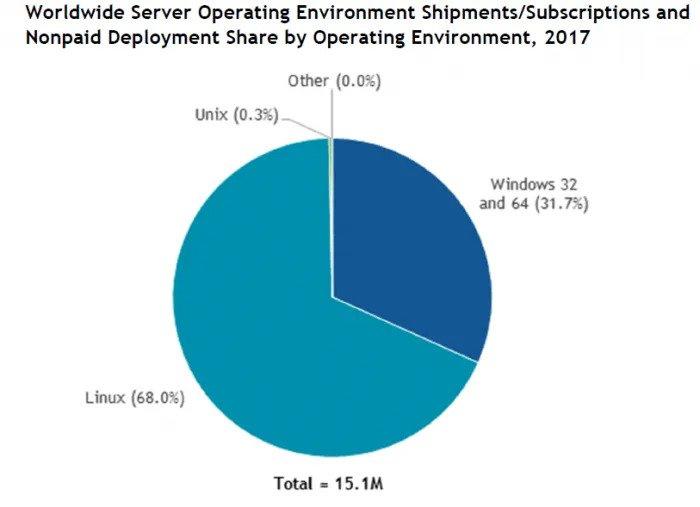What are the reasons for learning Linux?
Linux is one of the most popular operating systems for system administrators, network engineers, IT technicians and many other IT professionals. Thus, What are the reasons for learning Linux? And why is Linux so popular? In this post, we will discuss the benefits of Linux and answer these questions.
As you know, there are various skills in information technology (IT) that employees in this field must be fully familiar with, and Linux is one of these skills.
What makes Linux so great? Here are 11 reasons to learn Linux that show the superiority of Linux over other operating systems.
1. Use Linux on most servers
If you have a little information about servers, you will see that Linux has the most applications on servers compared to other operating systems. This advantage is mostly due to the compatibility of Linux with a variety of devices.
Just to better understand the power of Linux in navigating the Internet, companies like Google, Facebook, Twitter, Amazon and many others run all their servers on Linux-based server software. Even the world’s most powerful supercomputer runs on a Linux-based operating system.

2. Free and open source
Reasons to learn Linux are free and open source. This means that you can view the source code used to create Linux (kernel) and examine them and see what that code does to your system. You can even create your own personal distribution.
In addition, because of the many programming interfaces you need, you can easily develop and install your own programs on a Linux operating system. With all of the above features, you can set up a Linux operating system at its most basic levels to suit your server needs, unlike Windows.
3. Stability and reliability
Linux is Unix-based, and Unix was originally designed to provide a powerful, stable, reliable, yet easy-to-use environment. Linux systems are widely known for their stability and reliability, and many Linux servers run for a long time without crashing or even restarting.
The question is, what actually stabilizes Linux systems? There are many determinants, including complete management of system and application settings, process management, security implementation, and more.
In Linux, you can change the system or program configuration file and apply the changes without having to restart the server, which is not the case with Windows. It also provides efficient and reliable process management mechanisms. If a process behaves abnormally, you can use commands such as kill, pkill and killall to send the appropriate signal to stop it.
4. Linux security
The Linux kernel is without a doubt the most secure kernel among operating systems. Linux implements various security mechanisms to protect files and services from attacks and abuse. You can use programs such as firewalls (eg iptables firewall), TCP overlays (to allow and block access to services), or even SELinux, which stands for Security-Enhanced Linux, which means improved security. Have a lot of security.
SELinux, for example, ensures that an HTTP server, FTP server, Samba server, or DNS server can only access a set of restricted files on the system as defined by file domains, and only a limited set of features defined by the system. Has been, let. Some Linux distributions, such as Fedora, RHEL / CentOS, etc., come with the SELinux feature.
In general, in Linux, any user or group must have the appropriate permissions before any action or program can be executed, otherwise any unauthorized action will always be blocked.

5. Linux flexibility
one of Reasons to learn Linux It’s flexibility and comes from the fact that you can adjust it to meet your needs: it lets you do whatever you want if you can. You can install a graphical user interface or simply run your server through a Linux terminal only.
Read more: Linux Terminal Personalization
Unlike other operating systems, Linux offers dozens of different tools that you can use to perform tasks such as system setup and service management, network management, software installation from various sources, performance monitoring, and general management of your server. Select.
One of the most powerful standard programs in Linux is the shell, which is a program that provides a compatible environment for running other programs in Linux and helps you interact with the kernel itself.
Basically, Linux gives you complete control over a system and helps you build the server the way you want and customize it for free.
6. Hardware support
Linux strongly supports a combination of computer architectures, both on modern and older hardware. This is one of the most important factors that makes Linux better than Windows and other operating systems.
Linux significantly supports relatively old hardware. Slackware Linux, for example, is hosted on a 600MHz Pentium III with 512MB of RAM. You can find a list of supported hardware and requirements for a particular distribution on their official websites.
7. Linux maintenance cost
One of the most important things for users is the cost of using and maintaining a system, for example, a Linux server is less expensive than a Windows server in terms of software and hardware purchase and maintenance costs, system support services, and so on. Unless you use proprietary Linux distributions such as RHEL or SUSE that require a subscription.
Studies by some institutes have also shown that Linux is cheaper in a typical server environment than Windows or Solaris.
Conclusion
Today, Linux has become a strategic, efficient and reliable platform for business systems in many small, medium and large companies. A higher percentage of Internet-powered servers run on a Linux-based operating system.
If you are a Linux or Windows user, share your reasons for the superiority of the operating system you are using in the comments section.

